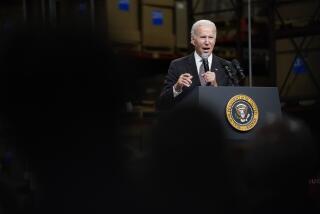Bush’s WMD Charges Appear to Be Baseless
- Share via
President Bush has repeatedly asserted that Iraq possesses weapons of mass destruction. This claim was the principal reason given for the war against Iraq. For example, during his press conference on March 6, Bush said, “I believe Saddam Hussein is a threat to the American people. I believe he’s a threat to the neighborhood in which he lives. And I’ve got good evidence to believe that. He has weapons of mass destruction, and he has used weapons of mass destruction in his neighborhood and on his own people.”
But on April 17 at a Pentagon town hall meeting, Defense Secretary Donald Rumsfeld was asked about what evidence the U.S. would present to counter a claim that the weapons of mass destruction we find were planted by us. Rumsfeld answered, in part, “I don’t think we’ll discover anything.... The inspectors didn’t find anything, and I doubt that we will. What we will do is find the people who will tell us.”
Several days later, two top Iraqi scientists who surrendered this month asserted in debriefings that everything was destroyed after the 1991 Gulf War (“U.S. to Step Up Its Search for Banned Arms,” April 20).
It looks as though the evidence was never strong enough to justify a war.
Steve Schlein
Venice
*
In “Hard Jobs Require U.S. Power” (Opinion, April 20) William Shawcross writes, “The French ... are chagrined to be proved so wrong.” Wrong about what? Rumsfeld now says we may never find any Iraqi weapons of mass destruction, though surely the undetectable weapons must exist. After all, no one could see the earlier evidence either, but it certainly existed, because Secretary of State Colin Powell told us so. We promised to leave quickly, but now it will take at least two years to force the Iraqis to accept the government we want. The world awaits the next big lie.
George Tucker
Redondo Beach
*
Re “Overthrow Now, Pay Later,” Opinion, April 20: Although Jon Wiener correctly labels U.S. interventions in Iran, Guatemala and Vietnam as misadventures with horrific, unintended consequences, his account is unbalanced. American action in the Balkans and Afghanistan was appropriate and essential. The final word on Iraq isn’t in yet, but it seems increasingly likely that the French, Germans and Russians were wrong and the U.S. and British were right. Favorable ripple effects already are being seen in Syria and other parts of the Middle East.
Moreover, the lack of involvement by the United States and, for that matter, by the U.N. to halt violence in Somalia and other African countries is unconscionable. The real failure here lies with the inability of the five permanent members of the U.N. Security Council to put aside their petty self-interests in favor of a unified voice and concomitant military force that could respond to halt violence whenever and wherever it occurs.
It is time to stop talking about a global rapid-reaction force and to start building it. All members of the United Nations should be required to contribute. Ultimately, to the chagrin of American defense contractors, the savings in global military expenditures would be staggering. And, although our own American military dominance will eventually have to be superceded, we will never have a truly advanced civilization otherwise.
Lewis K. Waldman
La Jolla
*
A question for John Balzar regarding “A Casualty of the War: Martyrdom” (Commentary, April 20): Do you imagine for a moment that the chicken hawks in the White House would’ve been willing to lay their lives on the line to “free Iraq”? Don’t make me laugh. It is precisely because the leaders throughout history have so rarely been willing to risk their own necks for their military adventures that I remain an adamant pacifist.
Kevin Caldwell
Venice
More to Read
Sign up for Essential California
The most important California stories and recommendations in your inbox every morning.
You may occasionally receive promotional content from the Los Angeles Times.













